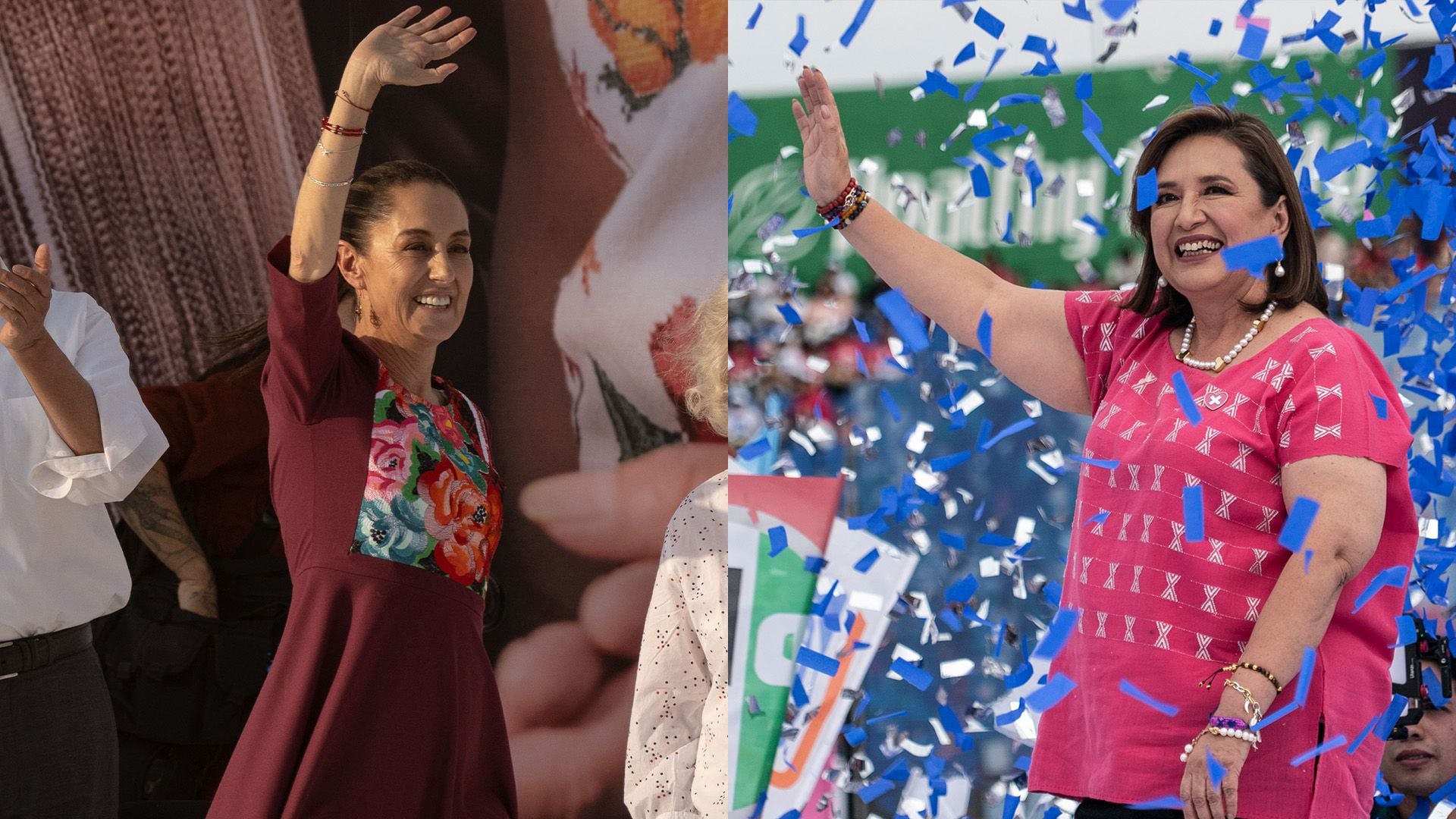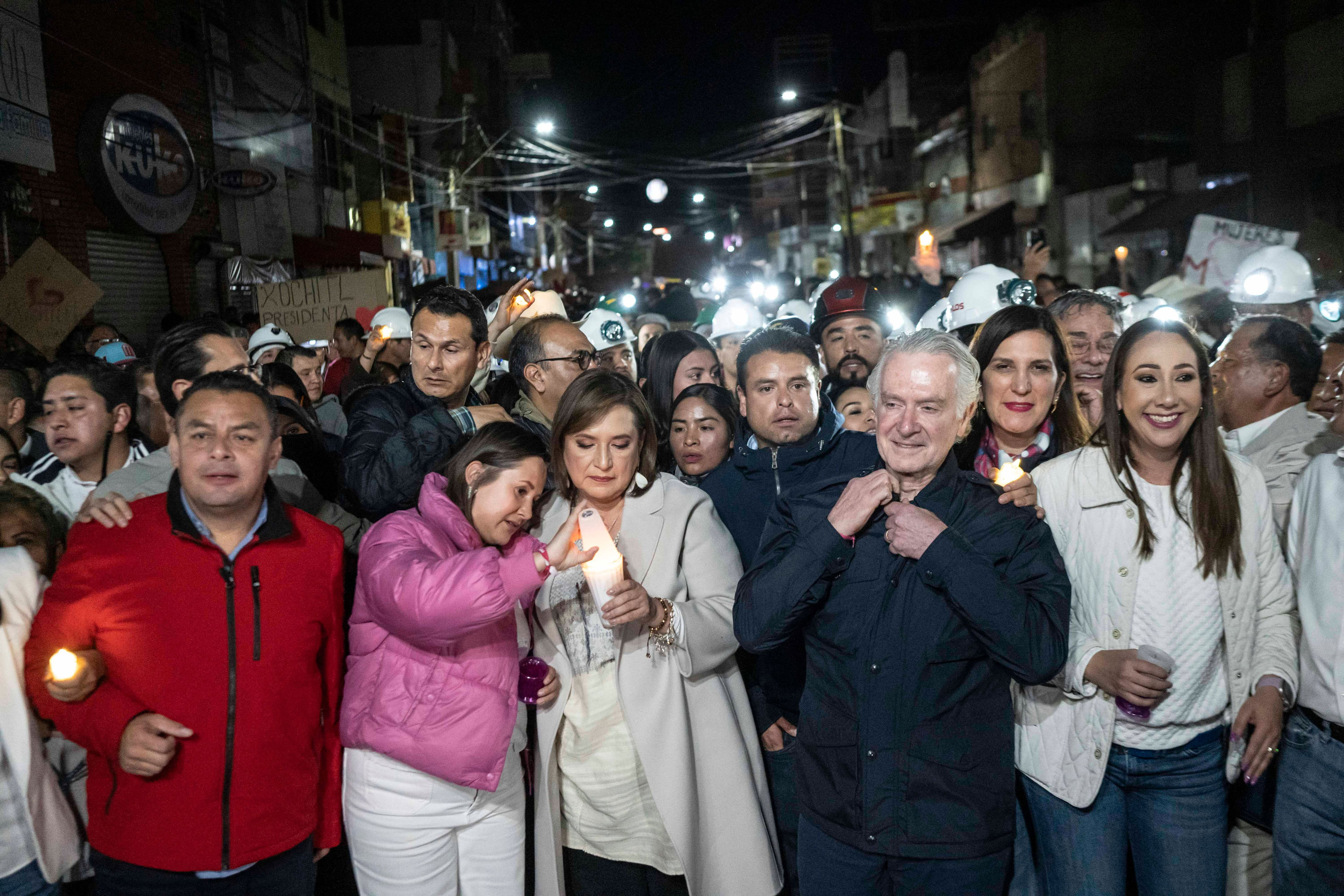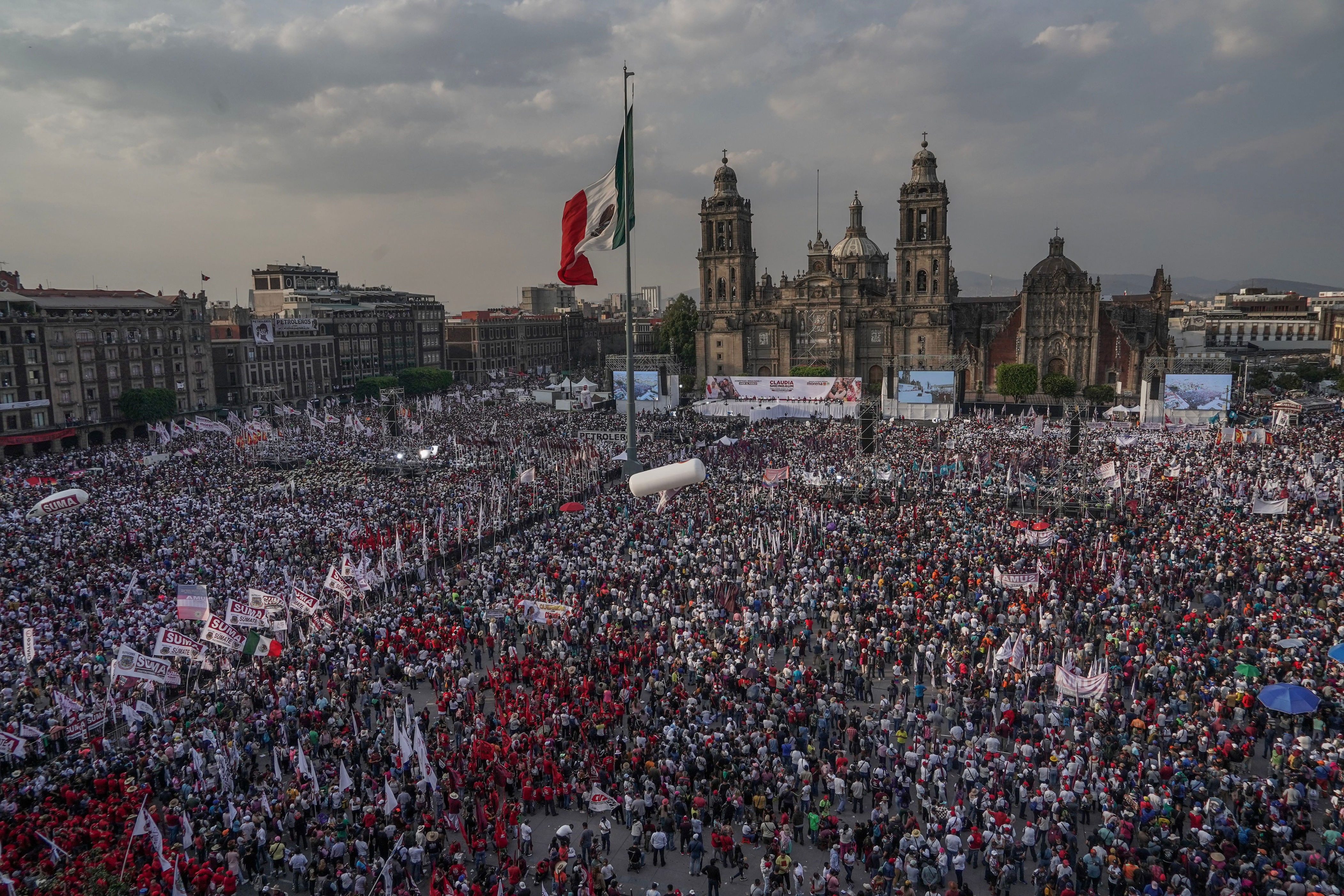
Claudia Sheinbaum and Xóchitl Gálvez at their respective campaign kickoff events.
Mexico’s presidential campaign is now underway, and it will culminate in its most interesting outcome in history: on June 2, a woman will be elected president, an unprecedented feat in North America. The political battle will be waged between Claudia Sheinbaum, of the ruling National Regeneration Movement (Morena) party, and Xóchitl Gálvez, who heads a coalition of the right-wing PAN (National Action Party), the weak PRI (Institutional Revolutionary Party) and the minority left-wing PRD (Party of the Democratic Revolution). According to the most favorable polls, Sheinbaum begins the race with a 30-point lead on her rival, a high bar to clear. The citizenry is satisfied with the thousands of social aid programs and grants it has received in recent years, and the opposition is unable to break through that support. So much so that, live at the opening of her campaign and in front of a notary and thousands of supporters, candidate Gálvez pricked her finger and used her blood to sign a sheet of paper committing not to destroy the social aid that somewhat limits the country’s poverty today. That spectacle underlines the opposition’s fear that Mexicans will reelect the Morena party for another six years, thereby ensuring that the country definitively escapes from PRI control and its recurrent, decades-long pattern of alternating power with PAN governments.
The momentum from Andrés Manuel López Obrador’s resounding 2018 victory and his so-called Fourth Mexican Transformation has not waned. It is what allows a candidate whose program — and even political gestures — is committed to “consolidating the path advanced by the president” in the current administration to navigate this election so comfortably. But that legacy has both positives and negatives. The biggest failure has been the government’s battle against violence; Mexico has an average of 100 deaths per day, which will exceed the previous six-year term’s total figure. It is not a coincidence that the opposition’s slogan is “For a Mexico without fear,” and candidate Gálvez will make this violence the heart of her campaign. She opened the electoral race in Fresnillo, Zacatecas, the city with Mexico’s highest perception of insecurity. It was a symbolic but brief opening stop, after which Gálvez moved to Irapuato, a town in the State of Guanajuato, which has one of the country’s highest rates of violence but is governed by the PAN, members of her coalition who massively embraced her at the campaign kickoff.

Xóchitl Gálvez walks through the streets of Fresnillo in the State of Zacatecas on Friday, March 1, at dawn.
For her part, Sheinbaum filled the capital’s Zócalo square, the largest plaza in Latin America, with the National Palace — where the charismatic president lives — behind her, in a symbolic gesture of where her political support comes from. There, on Friday afternoon, she unveiled 100 government promises that are not much different from what has already been done during AMLO’s current term. The economy is one of the ruling party candidate’s main trump cards. These days, the country boasts of having laid the foundations for a hopeful future, with a strong currency, robust foreign investments that point to an increase in employment and a rise in exports thanks to the enormous market next door, the United States, with whom Mexican relations are friendly and focused on the fight against drug trafficking and curbing migration.
A third candidate, Jorge Álvarez Máynez, is participating in the presidential election but his political strength is negligible. For years, his party Movimiento Ciudadano (Citizen Movement) has been representing itself as the third way for those who cannot find a place in any of the major parties, which are described as “the old politics.” Movimiento Ciudadano won some important seats in previous elections, but their campaign has been marred by stumbles and blunders that are hard to bounce back from. Hence, barring unforeseen events, a woman will hold Mexico’s highest office for the first time.
Sheinbaum, 61, comes from the academic middle class that generates revolution in the universities. The candidate participated in those struggles decades ago and today she proclaims that her government will be “of the people, for the people and by the people.” Mexican humanism, as it has been called, is a cocktail of fighting poverty by eliminating countless pockets of corruption and the privileges accrued in the past, and more recently. The government’s massive disbursement of social aid and grants has reduced poverty in recent years and created enormous sympathy for the president’s transformation movement, but corruption still has deep roots in Mexico. Leftists reproach the government for not carrying out a tax reform to levy the rich and redistribute wealth. These are the tasks that remain pending for Sheinbaum.

Mexico City’s Zócalo Square during Claudia Sheinbaum’s campaign kick-off event.
Gálvez, also 61, has demonstrated her rural and indigenous origins. She represents a self-made woman who left her village to study in the capital city, avoiding poverty as best she could. She became a successful businesswoman, which is why today she values merit and effort without much regard for luck or birth status. She jumped into the presidential race as an independent senator who caucused with the PAN, the most right-wing party in the Mexican Congress, although she says she does not identify with it much. She is the face of an unnatural coalition of parties that have always looked askance at each other but now have no choice but to join forces to even contemplate a decent result that might make the governing party squirm; it needs a large majority to achieve ambitious policies.
The June 2 elections will also decide thousands of seats in city councils, Congress and the Senate, along with eight state governorships and the mayorship of Mexico City. The capital has a huge voting population and is the most symbolic place in the whole country, which often serves as a launching pad for future presidents; that may be the case now if Sheinbaum wins the presidency after serving as Mexico City’s mayor. In the capital, the polls also favor the ruling party and its candidate for mayor, another woman, Clara Brugada, who has a long background in workers’ and social struggles. But Morena members express some concern about what may happen in the capital, where the party lost a huge number of delegates to the right in the 2021 mid-term elections. A lackluster result, even in victory, could affect the electoral performance of Morena politicians throughout the country.
For months, Mexico has been immersed in a long pre-campaign where, in the absence of intermediate parties, the elections are playing out between the right and the left. But these concepts are saying a lot for a country that still exudes the undefined ideology that the PRI imposed for decades.
Sign up for our weekly newsletter to get more English-language news coverage from EL PAÍS USA Edition
News Related-
Antoine Dupont still hurt by 'injustice' of World Cup loss to Springboks
-
China's New Aircraft Carrier Begins Catapult Testing
-
Aircraft Downed Inside Russia By Patriot System: Ukrainian Air Force
-
“Am I Prog’s Taylor Swift? That’s a debate that could run and run”: why Peter Hammill re-recorded his Enigma-era albums
-
Car With Pro-Russian Fighters Blown Up by Resistance: Exiled Mayor
-
Europe and African nations must find effective common ground in dealing with migration influx
-
Springbok lock opts not to renew contract with URC team
-
Pravin Gordhan’s deathly legacy: A threat to SA’s economic future
-
Antoine Dupont STILL hurt by ‘injustice’ of Rugby World Cup loss to Springboks
-
Rubber stamping NHI Bill will have damaging consequences for SA for generations
-
Inside horrific conditions Hamas hostages suffered including losing 15lbs in 50 days
-
After the Bell: SA’s NHI healthcare disaster starts right here
-
Gupta-linked development land for sale
-
Gary Neville begrudgingly claims brilliant Man Utd midfielder ‘looked like a Man City player’ in Everton mauling
